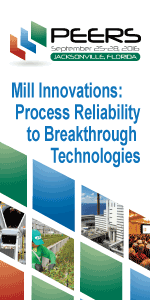TAPPI Committee Develops ‘Power’ Tools for Mills

TIPs offer a technical reference shelf in an easy-to-access digital format.
Could your mill benefit from expert tools for power and recovery boiler operators and engineers? TAPPI TIPs (Technical Information Papers), which are developed by TAPPI committees, bring together experts from pulp mills, suppliers, and scientists to develop state-of-the-art guidelines and best practices for key industry processes.
The Energy, Recovery and Recaust Committee (formerly known as the Steam & Power/Energy Management Committee) focuses on the overall pulp and paper mill heat and power systems. Experts from Georgia-Pacific, International Paper, PCA, WestRock, Andritz, Valmet and many other companies regularly meet to discuss technical and operational issues, all in an antitrust governed setting.
“I have been a member of this committee for 12 years,” notes Chris Jackson, Nautilus Loss Control and chair of the Energy, Recovery and Recaust Committee. “The caliber of the people pitching in to capture industry knowledge in TAPPI TIPs astounds and humbles me. Over the years, this committee has generated an amazing breadth of knowledge. Our meetings are an excellent exchange of technical knowledge and experiences that benefit the industry as a whole.”
A TIPs Library
The Energy, Recovery and Recaust Committee maintains many TIPs that should be part of your mill’s reference shelf. These TIPs were developed specifically to help those in the field maintain and troubleshoot their systems. This list shows resources for a variety of categories:
Boiler Feedwater:
- Response to contamination of high purity boiler feedwater – TIP 0416-05
- Design engineer decisions tree: paper mill boiler feedwater – TIP 0416-04
- Keys to successful chemical cleaning of boilers – TIP 0416-06
- Water quality and monitoring requirements for paper mill boilers operating on high purity feedwater – TIP 0416-03
- Water quality guidelines and monitoring requirements for paper mill boilers operating with softened makeup water – TIP 0416-14
- Water treatment-related opportunities for energy conservation in a paper mill powerhouse – TIP 0416-13
- Evaluating reverse osmosis for treating makeup to the boiler feedwater in a pulp and paper mill – TIP 0416-07
Boiler Operation and Performance:
- Energy checklist: pulp mill – TIP 0416-24
- Recovery boiler energy efficiency improvements – TIP 0416-16
- Recovery boiler performance calculation - short form – TIP 0416-01
- Guidelines for replacement of generating bank tubes with expanded joints in two-drum boilers – TIP 0416-08
- Chloride and potassium measurement and control in the pulping and chemical recovery cycle – TIP 0416-15
- Best practice for recovery boiler inspection (optimizing inspection scope) – TIP 0416-26
- Explanation of recovery boiler leak indications – TIP 0416-23
- Estimating the first melting temperature of fireside deposits in recovery boilers – TIP 0416-12
Evaporators:
- Recommended test procedure for black liquor evaporators – TIP 0416-11
Sootblowers:
- Recovery boiler sootblowers: practical guidelines – TIP 0416-20
- Recovery boiler sootblower: the basics – TIP 0416-19
NCGs, Condensates and Emissions:
- Collection and burning of concentrated noncondensible gases: regulations, design, and operation – TIP 0416-09
- Stripping of Kraft pulping process condensates: regulations, design and operation – TIP 0416-10
- Nitrogen oxide emissions control from biomass and Kraft recovery boilers in the pulp and paper Industry – TIP 0416-25
Economizers:
- Guideline specification for procurement of an economizer for a recovery boiler – TIP 0416-21
- Guidelines for operating and maintenance practices impacting an economizer on a recovery boiler – TIP 0416-22
Burning Biomass:
- Sampling procedures for biomass fuel for boiler performance testing – TIP 0416-17
- Performance test procedure for boilers using biomass as fuel – TIP 0416-18
New TIPs are regularly developed, and suggestions for others are welcome. Several new TIPs are currently being developed:
- Recommended practice for refractory selection and installation in recovery boilers
- Black liquor recovery boiler inspection planning and implementation
- Green liquor density measurement
- Sodium sulfate (sodium thiosulfate) and reduction efficiency measurement of green liquor in chemical recovery processes
- Definitions of black liquor recovery furnace availability (reinstatement)
- Refractory selection for Lime Kilns
TAPPI TIPs are available individually or as a complete set along with TAPPI Standards. Online subscriptions are available for individuals or companies.
Career Opportunities
If you work in a pulp or paper mill, or provide technical support to mills, volunteering on a technical committee is an opportunity you really should step up to – it will have an immediate impact on your job. New to the industry? Committees welcome those new to the job. In 2015 the Energy, Recovery and Recaust Committee established a liaison with TAPPI’s Young Professionals to provide opportunity for members early in their careers. Technical committees are a great place for today’s experts to share their knowledge with new engineers and chemists.
The Energy, Recovery and Recaust Committee is part of TAPPI’s Engineering Division and has four active subcommittees: Power and Recovery, Energy Management, Water Treatment, and Lime Kiln and Recausticizing. Each committee meets face-to-face one to two times a year, and occasionally holds conference calls. Whether you are a technical expert or new to the field, TAPPI’s Energy, Recovery and Recaust Committee welcomes your participation.
If you would like to join the committee or one of the subcommittees, please contact TAPPI Member Connection Center at memberconnection@tappi.org or 1-800-332-8686 (US), 1-800-446-9431 (Canada), or +1-770-446-1400. If you would like to be a member of any group working on the new TIPs in development, please contact standards@tappi.org and mention the subject area(s) in which you would like to participate.
For a modest investment of $174, receive more than US$ 1000 in benefits in return.
Visit www.tappi.org/join
for more details. |




